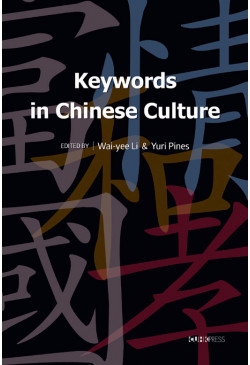The Semantics of Qurʾanic Language: al-Āḫira
In The Semantics of Qurʾanic Language: al-Āḫira, Ghassan el Masri offers a semantic study of the concept al-āḫira ‘the End’ in the Qurʾān. The study is prefaced with a detailed account of the late antique concept of etymologia (Semantic Etymology). In his work, he demonstrates the necessity of this concept for appreciating the Qurʾān’s rhetorical strategies for claiming discursive authority in the Abrahamic theological tradition. The author applies the etymological tool to his investigation of the theological significance of al-āḫira, and concludes that the concept is polysemous, and tolerates a large variety of interpretations. The work is unique in that it draws extensively on Biblical material and presents a plethora of pre-Islamic poetry verses in the analysis of the concept.
zum Buch in disco
zum Buch auf der Verlags-Website
Keywords in Chinese culture
What elevates a mere word to the status of keyword? What does it mean to translate a keyword and map its meaning against other languages?
Like every major culture, Chinese has its set of “keywords”: pivotal terms of political, ethical, literary and philosophical discourse. Tracing the origins, development, polysemy, and usages of keywords is one of the best ways to chart cultural and historical changes. This volume analyzes some of these keywords from different disciplinary and temporal perspectives, offering a new integrative study of their semantic richness, development trajectory, and distinct usages in Chinese culture.
The authors of the volume explore different keywords and focus on different periods and genres, ranging from philosophical and historical texts of the Warring States period (453–221 BCE) to late imperial (ca. 16th–18th centuries CE) literature and philosophy. They are guided by a similar set of questions: What elevates a mere word to the status of “keyword”? What sort of resonance and reverberations do we expect a keyword to have? How much does the semantic range of a keyword explain its significance? What kinds of arguments does it generate? What are the stories told to illustrate its meanings? What are the political and intellectual implications of the keyword’s reevaluation? What does it mean to translate a keyword and map its meaning against other languages?
Throughout Chinese history, new ideas and new approaches often mean reinterpreting important words; rupture, continuities, and inflection points are inseparable from the linguistic history of specific terms. The premise of this book is that taking the long view and encompassing different disciplines yield new insights and unexpected connections.
zum Buch im ULB-Katalog
zum Buch auf der Verlags-Website
Weitere Titel können Sie in unseren Neuerwerbungslisten für die Sprachen und Kulturen Asiens, Afrikas und Ozeaniens entdecken!

